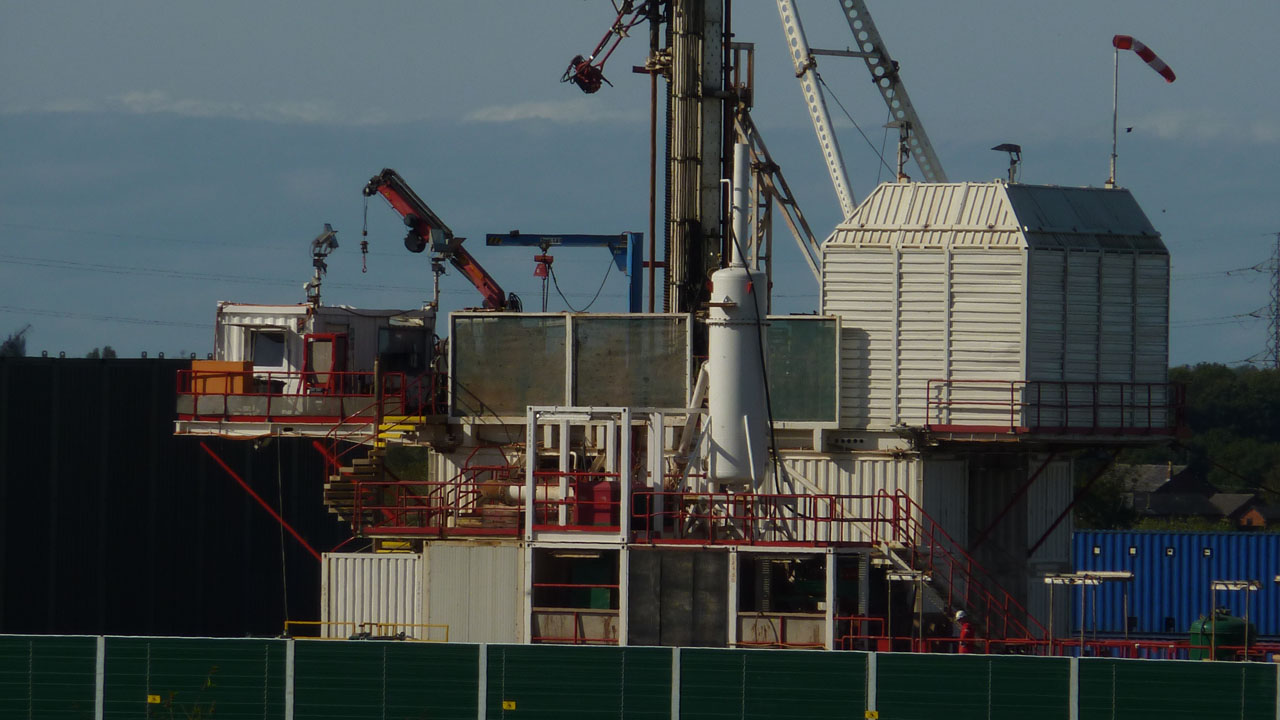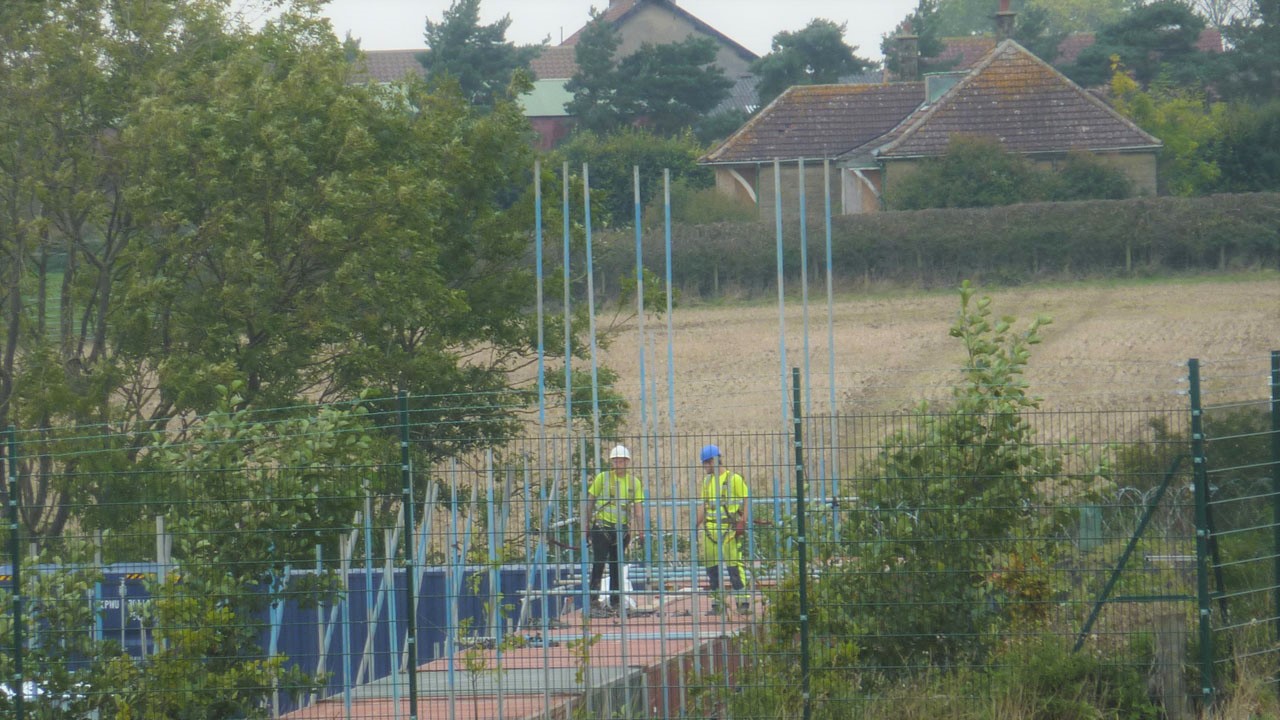
Cuadrilla’s Preston New Road shale gas site near Blackpool, 27 September 2017. Photo: DrillOrDrop
Researchers meeting in Birmingham this week are to discuss a major study which aims to update evidence on the impact of fracking.
The £8m programme, the largest investment in unconventional hydrocarbons research by one of the funders, will provide evidence to inform government policy.
A town hall-style meeting on Wednesday (4 October 2017) will examine the challenges for the research and opportunities for collaboration.
The programme, funded by the Natural Environment and Economic and Social Research Councils, aims to update the independent scientific evidence base on fracking. The work will, the funders say, provide “understanding of the potential environmental and socio-economic impacts of unconventional hydrocarbon development”.
Last month, researchers across the UK were invited to bid for the money. Projects are expected to begin in the summer of 2018 and run until at least 2022.
Part of the research programme is expected to use a new underground research facility, confirmed last week to be based at Ince Marshes in north Cheshire.
“Late in the day”

Building a sound barrier at Third Energy’s Kirby Misperton fracking site in North Yorkshire, 27 September 2017. Photo: DrillOrDrop
There has been no high volume hydraulic fracturing in the UK since 2011.
But Cuadrilla has said it expects to use the process early next year on two wells at its site at Preston New Road, near Blackpool. Third Energy is waiting for approval of its hydraulic fracturing plan for a well at Kirby Misperton in North Yorkshire. Shale gas exploration is also expected to get underway in the East Midlands, where IGas has permission for three wells and INEOS has three sites going through the planning system.
Opponents of fracking in Lancashire have complained that the research has come too late.
Claire Stephenson, of Frack Free Lancashire, told the Blackpool Gazette:
“It seems rather late in the day to be throwing research money into environmental and socio-economic impacts of unconventional gas exploration.
“Surely this research should have been implemented prior to handing out PEDL licenses across the UK? Community health and drinking water integrity is a monumental factor in fracking, yet it has been virtually ignored by Public Health England and the government, as they choose to rely on industry-funded and outdated research for facts.”
“Significant investment”
The research programme will look at:
- Current state of shale gas development and how it is evolving
- Shale resource potential, distribution, composition and properties, including safety issues of fracking and geological faults
- Impact of fracking on overlying rocks
- Emissions of contaminants to rocks and atmosphere and their likely impacts
- Socio-economic impacts, looking at energy security, competitiveness, sustainability, public perception and policy
The Natural Environmental Research Council (NERC) is putting £6m into the programme. £2m is from the Economic and Social Research Council (ESRC).
Ned Garnett, Associate Director of Research at NERC, described the programme as a “significant investment”.
“From an NERC standpoint, we haven’t done anything on this scale before.
“In terms of the science budget, I believe it is the biggest investment NERC has made in research on unconventional hydrocarbons and shale gas.”
He said it could link to the £31m investment in the UK Geoenergy Observatory, also known as UKGEOS, part of which will be at Ince Marshes.
Dr Garnett said UKGEOS gave researchers the opportunity to do what he called “excellent science of societal importance”.
Asked why NERC hadn’t commissioned earlier studies on fracking, before it got underway, he said:
“We didn’t have UKGEOS two, three, four, five years ago so that does provide us with an opportunity to make very deep observations associated with this.
“Yes, more research could have been done on this earlier but I think we have the opportunity now to have a really significant advancement in terms of our scientific understanding because we will have the infrastructure to do it.”
The programme will fund up to 10 research proposals from UK universities and research institutions. The studies will be independent but researchers could partner with businesses or campaign groups, Dr Garnett said.
“If they want to partner with someone who is actually undertaking hydraulic fracturing they can do that. But the evidence that they come up with has to be independent of any third party or business organisation.
“Particularly on the social side, if they want to, they can partner with campaigning organisations. It is very much for the applicants but the funding that we produce goes to institutions, it wouldn’t go direct to business or campaign organisations.”
“Good decisions need good evidence”
Dr Garnett said:
“The key thing is providing the independent evidence that government needs so that they can make the right policy decisions.
“We are independent of government but we see our role clearly as providing evidence to inform decision-makers. If you want to make good decisions you need good evidence. And that’s what we want to do – provide that evidence.”
“Put exploration on hold”
Frack Free South Yorkshire said:
“We welcomed this initiative and the unsaid acceptance that the reports on shale gas by The Royal Society and by Public Health England are out of date and incomplete.
“The sensible course of action now is to put a hold on all exploration and appraisal shale gas wells until this research is completed and the results and recommendations are published and peer assessed sometime after 2022.”
- DrillOrDrop’s request to attend Wednesday’s meeting in Birmingham was declined. Presentations have been made public and are available to view here
Fracking monitoring at UKGEOS

Ince Marshes, Cheshire. Photo: NERC
The UKGEOS facility in Cheshire will look at how shale gas behaves underground, the British Geological Survey (BGS) said last week (press release).
The BGS said UKGEOS would not commission shale gas fracking. But if companies used the technique in the area, UKGEOS would monitor the effects.
Professor John Ludden, Executive Director of the BGS, said:
“North Cheshire is under an onshore oil and gas licence, with operators actively exploring the area. The UK Geoenergy Observatories will build on Cheshire’s standing as an energy hub and strengthen this corridor of scientific activity, which stretches from the Jodrell Bank Observatory in the east, through the Daresbury Laboratory, to our research site, which would draw in some of the best scientists and engineers in the world.
“We need the subsurface environment to develop a mix of low-carbon energy technologies at the required scale – whether that’s for carbon storage, energy storage, geothermal energy, hydrogen production or lower-carbon energy sources. It is vital that we build the best-possible geological evidence base to be able to optimise the process without an adverse impact on the environment.”
But Chester MP, Chris Matheson, told the Chester Chronicle last week:
“The people of Chester and surrounding area have made it clear that we don’t want fracking and this latest development is not welcome.
“Academic studies about the optimum form of fracking cannot take into account the commercial pressures that fracking companies will face to minimise their costs and maximise their profits.”
Upton councillor, Matt Bryan, an anti-fracking campaigner, told the paper:
“This is a classic example of diverting investment and our brightest minds away from the long-term solution which is renewable energy production.”
Weaver Vale MP, Mike Amesbury, feared UKGEOS would “pave the way for fracking” on the edge of his constituency.
80 boreholes
UKGEOS will drill 80 observation boreholes of various depths across a 28km2 of the Ince Marshes,
The boreholes are designed to enable researchers to study geology in what is described as unprecedented detail, including seismic activity and how fluids and gases flow through rocks.
The BGS said data collected from the research at UKGEOS would be made available to local communities, as well as academics, government, regulators and industry.
- Community meetings about UKGEOS are planned for Wednesday 11 October at Elton Village Hall (10am-2pm) and Thornton Church Hall (6pm-8pm). Further sessions are planned throughout the autumn for Chester, Dunham, Frodsham, Hapsford, Helsby and Ince.
Categories: Research

Well David, have fun “rebutting” Injuneer’s comments. I am sure it will be very entertaining but I suspect somewhat historic. I’m afraid I will not be too interested in reading it-I was trained in my 20s not to write any scientific report containing “mights”, and switch off when I see those who ignore that lesson. Not science, but speculation, was the advice I was given. Maybe grammatical, but then so was “Alice in Wonderland”.
I certainly did not state that OPEC was keeping prices low. I’m sure they would love to move them higher. It is US output that has dictated that the MARKET has moved lower, even with OPEC reducing output, and restrictions upon Russian exports. I know that economics is a huge Achilles heel to the antis, but continuing along a “flat earth” economic path that ignores the positive economic impact from US fracking may fool a few who are easily fooled, but the majority are not and will find such assertions ludicrous. It’s just another case of when the facts don’t fit, change the facts. All good fun, but it does tend to erode the credibility of those desperate enough to do it.
That’s a solid position to take Martin. You could inform the government that they should abandon any ‘speculation’ that there ‘could be’ 500 years worth of gas supplies in UK shale formations and that they ‘might’ be able to give 10 million pounds to each local community where the wells are sited … 10 million pounds that wouldn’t even cover the road damage, groundwater restoration and police bills btw.
I see the speculation is catching PhilipP. That’s the problem with the antis, they have few facts to utilise (remember Pennsylvania?) , then it is speculation (“it is irresponsible and misleading to apply those local flow results outside that and other similar fault zones”) and then fabrication (“no oil bonanza in the region without wholesale fracking of horizontal wells”.)
I thought Cuadrilla had just paid out the first £100k to the local community?? Not a lot (yet), but this is only the test phase and no gas has yet been extracted. Just see where the public opinion chart goes if/when £10m is paid out to local communities! (There are existing examples, so no speculation needed.)
Gosh! Looking to Amerca for examples now Martin … haven’t you always argued against that, or is that only when it comes to evidence of the downsides?
No PhilipP-good factual examples from USA. What their fracking has done to world oil prices is probably the best. Elephant in the room that it is. You and David, and others, try your best to contradict it, but you would be better to ignore it, as you can only defend through fabrication. An elephant is pretty obvious and saying it is a mouse doesn’t change the FACTS.
Giggling can be handy picking cherries no doubt, or do you only use royal mail and industry mags?
Always the way. No answers, so descent into nonsense.
Giggles – your kind of comeback – learnt from you Martin. Sorry if it hit the mark.
Not really PhilipP. I don’t have a mark to hit-I left that behind me many years ago. I’m not sure there is any point making a “comeback” without anything to say-but feel free.
Perhaps they should have a study on the impact of farmers on the environment .
A lot worse than a few oil wells !!